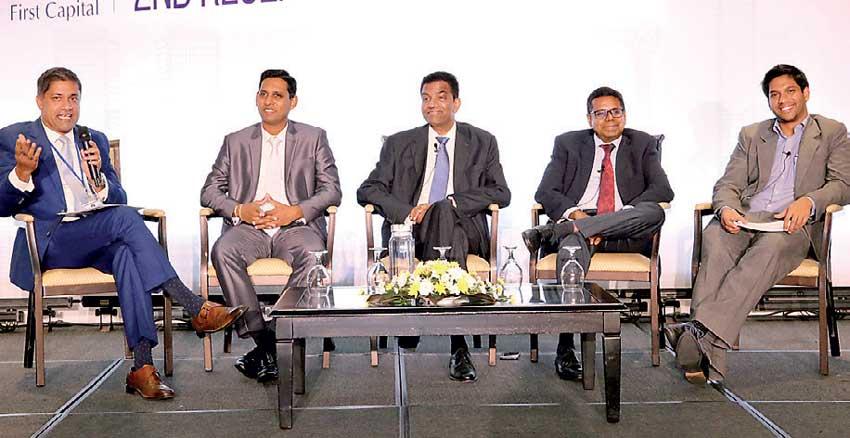20 Feb 2020 - {{hitsCtrl.values.hits}}

From left: First Capital Chief Executive Officer/Director Dilshan Wirasekara, First Capital Head of Research Dimantha Mathew, Commercial Bank Chief Financial Officer Nandika Buddhipala, Hatton National Bank PLC Chief Operating Officer Dilshan Rodrigo and Verité Research Research Director Deshal de Mel
Pic by Waruna Wanniarachchi
By Nishel Fernando
Despite the anticipated acceleration of economic activities and fiscal loosening, the deep tax cuts may create a challenge for the government to raise the estimated US $ 3-3.5 billion from external financing resources for external debt repayment, at reasonable rates, to maintain foreign exchange reserves above US $ 7 billion, according to Colombo-based First Capital Research.
“We believe foreign reserves, though currently remains at comfortable levels above the minimum four months of imports, foreign repayments start to slowly accelerate especially in the 2H2020. Thereby, it becomes critical for the government to refinance foreign loans of US $ 6 billion to maintain reserves at the current level,” First Capital Head of Research Dimantha Mathew said presenting its Strategy Report 2020, in Colombo, on Tuesday.
While noting that the government has announced plans to raise US $ 1 billion via a loan from China during the first half of the year, he remarked that the government would have raised US $ 2-2.5 billion through external financing during the second half of the year, to maintain the foreign reserves above US $ 7 billion.
“A large foreign loan or sovereign bond issuance needs to be raised in order to maintain the reserves above the US $ 7 billion mark,” he added.
Sri Lanka’s foreign repayment cover increased 2.1 in June last year, following the successful sovereign bond issuance and it fell to 1.3 by January this year. However, the Central Bank (CB) managed to maintain it around the US $ 7.5 billion mark.
In addition to US $ 1 billion sovereign bond maturity in October and maturity of Sri Lanka Development Bonds, he noted that Sri Lanka has foreign payments in the range of US $ 300-350 million on a monthly basis, in the form of project loan repayments with relatively high repayments in 2Q and 3Q of the year.
Sri Lanka’s total debt financing for 2020 is estimated at Rs.2.4 trillion.
Further, Mathew noted that a high budget deficit may also increase the government’s borrowing requirement, which is likely to push the rupee debt borrowing requirement to higher levels, impacting interest rates.
First Capital projects the budget deficit to expand to 7 percent of GDP this year due to the fiscal stimulus, while the IMF projected a budget deficit of 7.9 percent for the year.
Further, First Capital also noted that hefty tax cuts have prompted rating agencies to downgrade the outlook of Sri Lanka to ‘Negative’, indicating a possible rating downgrade in the future.
“It is likely to negatively impact when raising funds in the international market,”
Mathew said.
Joining a panel discussion at the occasion, Commercial Bank Chief Financial Officer Nandika Buddhipala said that the government could retain the confidence of international capital markets by aligning with the IMF’s structural reforms.
CB Governor W.D. Lakshman recently announced that the government might enter into a new programme with the IMF.
Verite Research Research Director Deshal de Mel opined that the government has gone overboard with the fiscal stimulus while noting that the consumer demand was already on the recovery mode following the shocks such as the Easter Sunday attacks.
“The tricky part is that it is a very significant cut. Smaller stimulus might have had desired impact in terms of driving the economic activities but the outcome now is. It’s not easy to avoid significant fiscal slippage because the space for expenditure cuts is limited,” he said.
De Mel expects the budget deficit to rise slightly above 7 percent of GDP, regardless of expenditure cuts.
However, the government expects the state revenue collections to pick up from second half of the year as the economic activities pick up.
De Mel stressed that the government needs to present a clear path to contain the budget deficit in the upcoming budget to retain the confidence of international markets.
In terms of credit growth, First Capital expects the private sector credit growth to bounce back to 14 percent YoY this year, backed by the tax cuts and easing of policy rates supported by a stronger growth in the 2H2020.
Credit flows to food and beverage is expected to pick up initially, followed by motor vehicles and possibly moving into retail housing. However, Mathew also cautioned that the trade deficit may also grow wider towards the 2H2020, amidst the possible rise in consumer demand, leading to a high level of consumer imports, pressurising the foreign reserves and rupee.
First Capital expects the exchange rate for 2020 to depreciate to the Rs.188.0-190.0 range per US dollar with stronger depreciation in the 2H2020, due to the anticipated uptick of imports.
Amidst concerns of possible overheating of the economy towards the next year, as seen in earlier election cycles, Mathew said that the CB may have to tighten the monetary policy rates.
First Capital Research projected 4.1 percent GDP growth for the year, mainly driven by the acceleration of economic activities towards the 2H2020.
Further, the research house also projected a 4.3 percent GDP growth for 2021 while noting a possible slowdown in growth towards the second half of 2021.
“With significant rise in business activity and production during the 2H2020, we expect it to flow towards the 1H2021 while some slowdown may be experienced in 2H2021 amidst possible monetary tightening measures,” Mathew added.
16 Nov 2024 47 minute ago
16 Nov 2024 1 hours ago
16 Nov 2024 1 hours ago
16 Nov 2024 1 hours ago
16 Nov 2024 1 hours ago